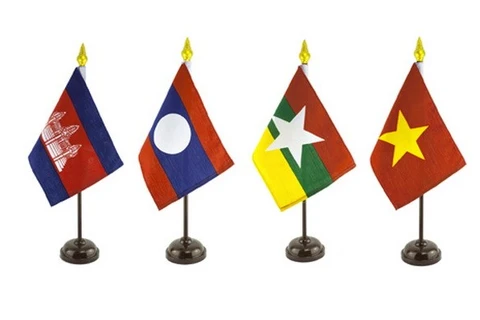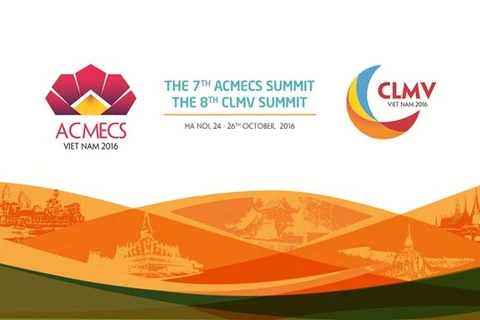Hanoi (VNA) – The seventh Ayeyawady-Chao Phraya-Mekong Economic Cooperation Strategy Summit (ACMECS 7) and the eighth Cambodia-Laos-Myanmar-Vietnam Summit (CLMV 8) opened in Hanoi on October 26.
Vietnamese Prime Minister Nguyen Xuan Phuc, Cambodian Prime Minister Samdech Techo Hunsen, Lao Prime Minister Thongloun Sisoulith, Myanmar President Htin Kyaw, Deputy Prime Minister of Thailand Somkid Jatusripitak, UN Under Secretary General Shamshad Akhtar, Secretary General of ASEAN Le Luong Minh attended the event among others.
In his opening speech, PM Phuc said that cooperation in CLMV and ACMECS have reaped numerous important outcomes over the years, contributing to spurring each country’s socio-economic development, building the ASEAN community, and consolidating sound neighbourly ties, peace and stability in the region.
The Mekong nations have become an important driving force for Southeast Asia economically and have been viewed as one of the leading dynamic zones in the globe, he said.
The summits will allow participants to discuss a new development environment and adopt cooperative contents and measures to build an economic zone of dynamism, competitiveness, sustainable development and inclusiveness.
He asserted that the Vietnamese Government places importance to CLMV and ACMECS cooperation and stands ready to work closely with member countries and other development partners for peace, stability, sustainable development and prosperity of the region.
For his part, Cambodian PM Samdech Techo Hunsen emphasised that ACMECS 7 and CLMV 8 affirm the determination to cement the growing neighbourly relations to bring benefits to member countries and their people.
Lao PM Thongloun Sisoulith noted that CLMV’s regional and global integration will bring practical benefits to regional residents, urging the countries to boost cooperation so to bolster synergy and increase cooperation efficiency.
Myanmar President Htin Kyaw pointed out challenges facing countries in their development efforts, stressing that the unity is the strength to surmount difficulties each country cannot solve itself.
He called on countries to strengthen cooperation, saying it is a key element to address changes at the global level.
Thai Deputy Prime Minister Somkid Jatusripitak said the ACMECS and CLMV summits are the most important cooperation mechanisms in ASEAN and such meetings reflected the dynamism of the global economy and multilateral fora.
ASEAN Chief Le Luong Minh stressed the important role of cooperation of the Mekong subregion in the ASEAN collaboration which helps boost development and realisation of regional commitments.
With the establishment of the community, ASEAN became the sixth largest economy and the third largest market in the world.
To realise the ASEAN Vision, the association needs contributions at national and regional levels, he said, adding the CLMV mechanism is an important factor in the regional integration.
Valuing the development of Mekong countries, Under-Secretary-General of the UN Shamshad Akhtar said the Mekong region has gained a certain stature in the region and the world with its economic growth and social progress, including the impressive rate of poverty alleviation.
She highlighted the bright growth outlook for the Mekong region, between 6-8.5 percent this year which is also supported by foreign investment.
CLMV is an indispensable part of ASEAN as well as relevant mechanisms. The UN will continue cooperating with the Mekong region towards the Sustainable Development Goals, she added.
To improve the effectiveness of trade and investment partnerships in the Mekong region, Chairman of the Vietnam Chamber of Commerce and Industry Vu Tien Loc said the countries’ Governments should step up administrative and institutional reforms, facilitate trade and investment, and enhance human resources training.
He called on trans-national businesses and development partners to work with the regional governments and give more resources for promoting the capacity and connectivity of small- and medium-sized enterprises, especially those operating in agriculture and rural areas, so that they won’t be left behind during the development process.
Suggesting solutions for cooperation between the Asian Development Bank (ADB) and the CLMV and ACMECS frameworks, an ADB representative said the bank will continue assisting the CLMV countries in narrowing the gap in infrastructure development, investing in soft infrastructure, facilitating transport and trade, and building energy and information technology markets. The ADB will also work with the CLMV and ACMECS nations to create public commodities, fight diseases and respond to climate change.-VNA

























